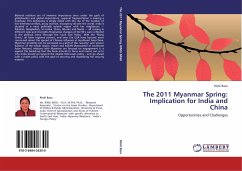
The 2011 Myanmar Spring: Implication for India and China
Opportunities and Challenges
Versandkostenfrei!
Versandfertig in 6-10 Tagen
52,99 €
inkl. MwSt.

PAYBACK Punkte
26 °P sammeln!
Bilateral relations are of immense importance since under the garb of globalisation and global dependence, regional fragmentation is making a headway. This dichotomy is simply visible with the rise of the number of low-intensity-conflicts, proxy warfare, insurgency all over the world. India is situated in a most politically volatile region with her neighbours Pakistan, Bangladesh, Sri Lanka, China, Bhutan and Nepal all coming in different sizes and strengths.Pragmative changes of the 90 s were reflected in the political arena through the Look East Policy . With the "Rising China," all Asian re...
Bilateral relations are of immense importance since under the garb of globalisation and global dependence, regional fragmentation is making a headway. This dichotomy is simply visible with the rise of the number of low-intensity-conflicts, proxy warfare, insurgency all over the world. India is situated in a most politically volatile region with her neighbours Pakistan, Bangladesh, Sri Lanka, China, Bhutan and Nepal all coming in different sizes and strengths.Pragmative changes of the 90 s were reflected in the political arena through the Look East Policy . With the "Rising China," all Asian regional powers, and even the USA have become more concerned about the spread of Chinese influence in Southeast Asia.China-Myanmar proximity can be perceived as a shift of the security and power balance of the whole region. Indian and ASEAN [Association of Southeast Asian Nations] relations with Myanmar are focused on engagement. It is against this backdrop that this book intends to focus and reason out as to why India should go beyond the idealist Nehruvian policy , and go ahead with a realist policy with the goal of securing and maximizing her security interest.












